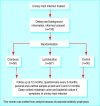Randomised trial of cranberry-lingonberry juice and Lactobacillus GG drink for the prevention of urinary tract infections in women
- PMID: 11431298
- PMCID: PMC33514
- DOI: 10.1136/bmj.322.7302.1571
Randomised trial of cranberry-lingonberry juice and Lactobacillus GG drink for the prevention of urinary tract infections in women
Abstract
Objective: To determine whether recurrences of urinary tract infection can be prevented with cranberry-lingonberry juice or with Lactobacillus GG drink.
Design: Open, randomised controlled 12 month follow up trial.
Setting: Health centres for university students and staff of university hospital.
Participants: 150 women with urinary tract infection caused by Escherichia coli randomly allocated into three groups.
Interventions: 50 ml of cranberry-lingonberry juice concentrate daily for six months or 100 ml of lactobacillus drink five days a week for one year, or no intervention.
Main outcome measure: First recurrence of symptomatic urinary tract infection, defined as bacterial growth >/=10(5 )colony forming units/ml in a clean voided midstream urine specimen.
Results: The cumulative rate of first recurrence of urinary tract infection during the 12 month follow up differed significantly between the groups (P=0.048). At six months, eight (16%) women in the cranberry group, 19 (39%) in the lactobacillus group, and 18 (36%) in the control group had had at least one recurrence. This is a 20% reduction in absolute risk in the cranberry group compared with the control group (95% confidence interval 3% to 36%, P=0.023, number needed to treat=5, 95% confidence interval 3 to 34).
Conclusion: Regular drinking of cranberry juice but not lactobacillus seems to reduce the recurrence of urinary tract infection.
Figures


Comment in
-
Lactulose may help prevent urinary tract infections.BMJ. 2001 Oct 20;323(7318):936. doi: 10.1136/bmj.323.7318.936. BMJ. 2001. PMID: 11668146 Free PMC article. No abstract available.
-
Regular drinking of cranberry-lingonberry juice concentrate reduced recurrent urinary tract infections in women.Evid Based Nurs. 2002 Apr;5(2):43. doi: 10.1136/ebn.5.2.43. Evid Based Nurs. 2002. PMID: 11995646 No abstract available.
References
-
- Foxman B, Barlow R, D'Arcy H, Gillespie B, Sobel JD. Urinary tract infection: self-reported incidence and associated costs. Ann Epidemiol. 2000;10:509–515. - PubMed
-
- Remis RS, Gurwith MJ, Gurwith D, Hargrett-Bean NT, Layde PM. Risk factors for urinary tract infection. Am J Epidemiol. 1987;126:685–694. - PubMed
-
- Ikäheimo R, Siitonen A, Heiskanen T, Kärkkäinen U, Kuosmanen P, Lipponen P, et al. Recurrence of urinary tract infection in a primary care setting: analysis of a 1-year follow-up of 179 women. Clin Infect Dis. 1996;22:91–99. - PubMed
-
- Gupta K, Scholes D, Stamm WE. Increasing prevalence of antimicrobial resistance among uropathogens causing acute uncomplicated cystitis in women. JAMA. 1999;281:736–738. - PubMed
-
- Reid G. Probiotic therapy and functional foods for prevention of urinary tract infections: state of the art and science. Curr Infect Dis Rep. 2000;2:518–522. - PubMed
Publication types
MeSH terms
LinkOut - more resources
Full Text Sources
Other Literature Sources
Medical
